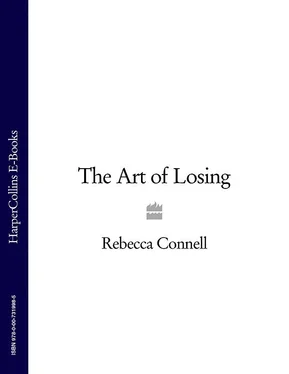We were curled up together in the library tower; it was the Tuesday lunch hour, which we always contrived to spend together. It had been one of our best times, when we seemed to be perfectly in synch, laughing and finishing each other’s sentences like a couple of much longer standing. I remember that it was raining lightly outside, the raindrops making a faint tattoo of noise on the skylight above us. Lydia was lying back in my arms, smiling up at me. I wanted to prolong the mood, and fatally I snatched at something that suddenly struck me as amusing.
‘You know, something funny happened earlier today,’ I said, and felt her squirm in delighted anticipation. ‘I was expecting a bulletin from the head of department, but I couldn’t be bothered to go and check my pigeonhole.’
‘So lazy,’ she said, and swiped her hand up to playfully tap my face. I caught it and bit it, making her squeal in outrage.
‘So anyway,’ I continued, ‘I asked Martin to go and check it for me. But when he was halfway there, I suddenly remembered that you might have left a note, and that he might recognise your writing. I had to sprint over to get there before him and pretend I had had a sudden spurt of energy—’ I was suddenly aware that Lydia had stiffened in my arms. She pulled away, staring incredulously at me. Already I realised my mistake, but it was too late to undo it.
‘How could you be so stupid?’ she whispered.
‘Look, I’m sorry,’ I said hurriedly. ‘I shouldn’t have told you. Listen, it was fine – he didn’t suspect anything. He thought it was funny.’
She carried on as if she hadn’t heard me, talking to herself. ‘How could I never have thought about anyone else seeing those notes?’ she said. ‘I put them in a public place where anyone could find them. We’ve been so stupid.’ She stood up, dusting off her skirt. I leapt up to stop her, but she pushed me away, avoiding my eyes. ‘I want to be by myself,’ she said, and in another moment she was gone. I could have run after her, but I didn’t want to arouse suspicion in anyone in the library downstairs. I told myself she would get over it, but I couldn’t shake off the dread that was slowly trickling through my veins, the feeling that I had ruined everything.
The next day she wasn’t at work. I waited at the library long past the time when I should have been teaching my first lesson. She didn’t appear on Thursday either. It took until Friday for me to crack and approach Martin. I gave him some cock-and-bull story about having needed to borrow a new set of books for my sixth-form class, and having noticed that Lydia was not there. Immediately I could tell that there was something he was keeping from me. He had a smug, self-satisfied look about him, as if he were cherishing a special secret that excluded me and everyone else. I pushed him harder than I had thought my pride would allow, desperate to get to the root of Lydia’s disappearance. Eventually he capitulated, with all the laughing good humour of a man who had everything he wanted. I was not to tell anyone just yet, but he and Lydia were leaving, he said. She had grown tired of London and wanted to settle down somewhere quieter, maybe start a family. At this point he blushed visibly with pleasure. She had always been impulsive, and ideally he would have liked to stay in London a little longer, but what was a man to do? The headmaster had been very understanding, and was allowing him gardening leave from the end of next week. He knew they would be happy, and he hoped that I would come and visit them, wherever they ended up. All at once he faltered, obviously realising that I was not heaping congratulations on his head. With a heart so full of panic, pain and incomprehension that I thought it was impossible that he should not see it, I shook his hand and wished him joy.
I saw Lydia once more before they left. She came to toast Martin at his leaving drinks – he had been at the school for six years, and although he had been consistently passed over for promotion, friendship and approbation, his colleagues apparently felt an urgent need to celebrate his reign. I watched her from the other side of the room, laughing and clinking glasses with all the suddenly gallant scientists flocking around her like bees round an exotic flower. She was wearing a tight black dress, her hair piled on top of her head, soft tendrils escaping and caressing her bare shoulders. I was furious with her, for looking so beautiful and happy, for leaving me. I thought that she had not seen that I was there at all, but when she and Martin turned to leave, hand in hand, she looked straight across the room at me for an instant. Her eyes were pleading, full of longing. I knew she was trying to tell me that she still loved me, but I looked back coldly, giving her no sign that I had understood, and then looked away. When I turned back she was gone.
I spent the next three years trying to get over her. I was promoted at work, and became head of department. I started tutoring the more demanding pupils one on one for an extra fee, and soon I could afford to move out of my box flat into somewhere far nicer. After those three years had passed I met Naomi, and she woke up the faintest echo of something in me that I had thought had died. We married a year later, and when I thought of Lydia, it was with the certain belief that I would never see her again. And for almost six years, I was proved right.
Lydia cannot always trust her memories. Scenes and events from her childhood swim into her mind with disturbing frequency, but she seems to have no way of sorting truth from fiction. She used to have a favourite memory – her father kneeling down to present her with a hot pink flower, her mother clapping her hands delightedly in the background, the setting luminous and imbued with well-being. One day she switched on the television and saw the very same scene eerily played out in some old film she must have seen years before, the faces blurred into unfamiliarity, but everything else identical to the picture in her head. It was the first but not the last time that she realised that her mind had played a trick on her. The memory had felt like hers, but it belonged to someone else. And as the years go by, she loses more and more memories, not by forgetting them, but by handing them back to their rightful owners.
She doesn’t know why, but she has always been this way. Her name, her age, all those everyday and automatically known things, have never seemed to be part of her in the way that they seem to be of other people. She is liable to misplace them, muddle them up in her head. So taking on her mother’s name feels strange to her, and yet not strange. It is just as much bound up with her as her own, and it needs to be used. It’s been hanging around unspoken for too long. She supposes that it is her mother’s memory she’s marking. However little Lydia remembers about her, and however unreliable it may be, she existed. That shouldn’t be forgotten. Least of all by him.
Adam’s flowers are starting to wilt. She has kept them in a vase by her bed for the past week, and for days they stayed in full bloom, their crimson petals so plushly perfect that she had to inspect them several times to make sure they were real. She knows that Sandra has noticed them; a sly hint was dropped at the dinner table, a jocular attempt to find out the identity of the sender, but she pretended not to understand. Now the roses are curling and browning slightly at the edges. In another day or two they will be dead, and she will have to decide whether to throw them out, or whether to swallow her pride and press them into dried-out husks, as she secretly wants to. Sitting at her dressing table, she plucks a petal off and crushes it between her fingers, the sweet scent rubbing off on to her skin. He cannot have known that roses were her favourite flowers, although she supposes it is a common enough choice.
Читать дальше












